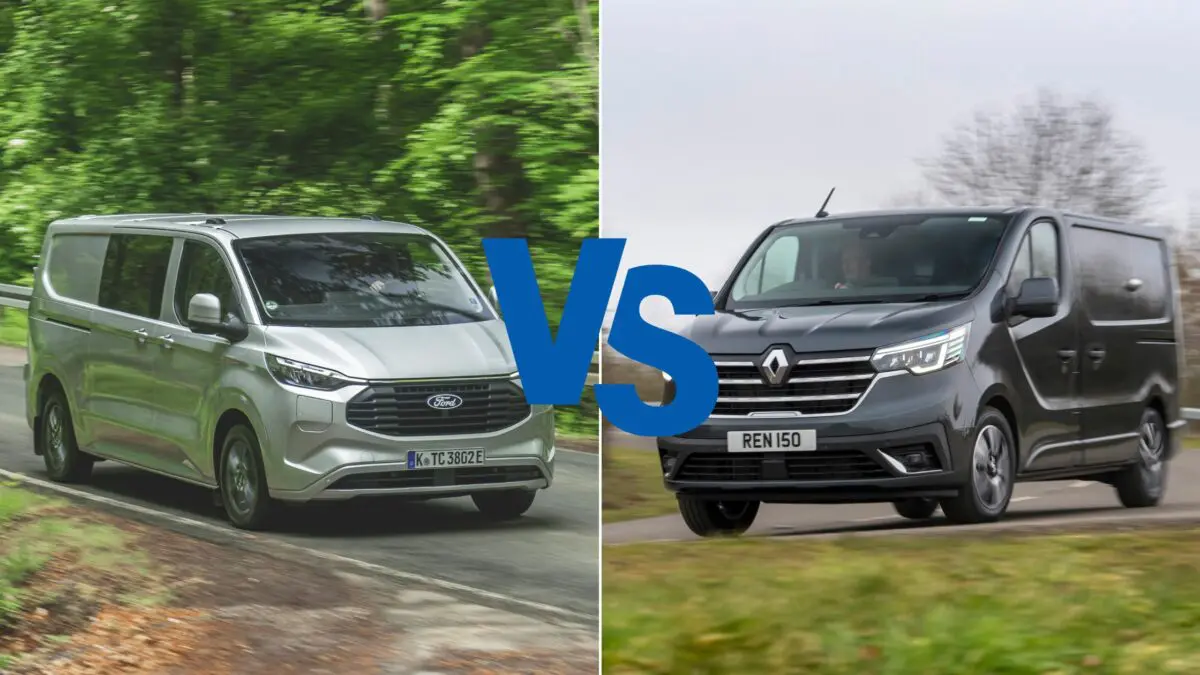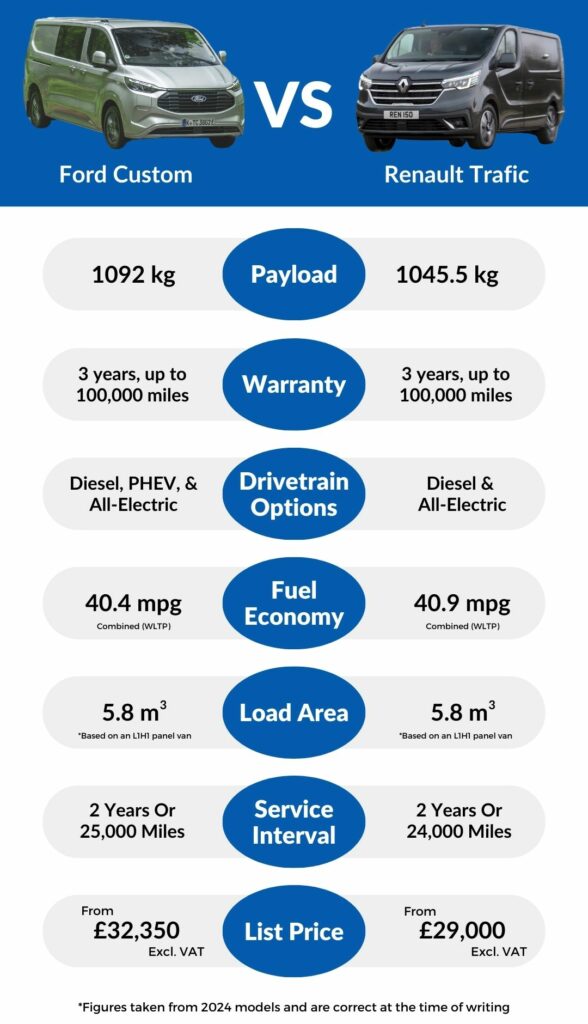
Ford Custom vs Renault Trafic: Which Van Should You Buy In 2026?
In our ultimate Ford Custom vs Renault Trafic guide, we’ll be comparing each model to help you decide which one to buy in 2026.
When choosing a new medium-sized van that can handle both business and pleasure, two vehicles come to mind: the Ford Transit Custom and the Renault Trafic.
Both dominate UK roads and are renowned for their practicality, reliability and versatility.
However, deciding between a Ford Custom and a Renault Trafic requires a closer look at what they both offer.
From payload and load areas to warranties and service intervals, in the guide, we’ll be diving deep into the strengths and weaknesses of each to help you make an informed buying decision.
Contents:
- Payload
- Manufacturer’s Warranties
- Servicing Intervals
- Powertrain Options
- Fuel Economy
- Load Area
- Retail Price
- Conclusion
In The Market For A New Renault Trafic Or Ford Custom? Click Here To Browse Our Full Inventory – All With Free UK Delivery

What We’re Analysing And Why
First, a few ground rules.
All data for each vehicle presented in this guide comes directly from the manufacturer’s most recent brochure and is correct at the time of writing.
Vans these days come in an extensive range of sizes, power outputs, drivetrains, and even specifications.
For most categories, we’ll be using Ford and Renault models that are as similar to each other as possible.
For example, power options for Ford’s new Transit Custom start at 110 PS, while the lowest-powered Renault Trafic you can get is 130 PS.
In our fuel economy comparison, we’ve used Ford’s 136 PS Transit Custom option as it matches the 130 PS Trafic more closely. We believe it’d be unfair to compare the fuel economy of two different engines with completely different levels of power.
Second, we’ll only be comparing factual data.
Subjective factors such as style, brand preference/reputation, and even long-term reliability won’t be included as they’re largely based on opinions.
This will create an even playing field for each van model, ensuring a much fairer comparison.
So, without further ado, let’s get stuck into this Ford Custom vs Renault Trafic showdown.

Payload
Based on L1H1 panel van variants
Ford Transit Custom Payload
848 – 1,336 kg (1092 kg average)
Renault Trafic Payload
970 – 1121 kg (1045.5 kg average)
Payload Summary
Neither Ford nor Renault give a single figure for their model’s payload. This is because factors such as the gross vehicle weight, engine size, wheelbase lengths etc. will affect a vehicle’s payload.
This creates a headache for the manufacturers. They probably do not have the time or resources to measure separate payloads for every possible engine, spec and size combination.
Instead, they’ll advertise an expected payload range, which will vary depending on each van’s configuration.
So, we’ve had to calculate an average based on these advertised ranges.
Based on these averages, the Transit Custom edges this category by 46.5 kg.
Ford advertises a wider spectrum in their van’s expected payload, though, which might make buyers a tad cautious.
The difference between their minimum and maximum expected payload is 488 kg, whereas Renault’s is 151 kg.
Renault’s minimum payload is better than Ford’s by 122 kg. However, the Custom’s maximum payload is better than the Trafic by 215 kg.

Manufacturer’s Warranty
New Ford Transit Custom Manufacturer’s Warranty
3 years / up to 100,000 miles
Renault Trafic Manufacturer’s Warranty
3 years / up to 100,000 miles, unlimited mileage in the first two years
Warranties Summary
The new Ford Transit Custom and Renault Trafic both come with a manufacturer’s warranty of 3 years, covering up to 100,000 miles.
However, the Renault Trafic offers unlimited mileage coverage during the first two years, providing more flexibility.
Neither of these warranties is the best available on the market, but they’re definitely on par with the industry standard.
Three years of coverage goes a long way.
Using some quick maths, as long as you’re doing less than 33,333.33 miles a year, you’ll be covered for the duration.
Extended warranties are available for both vehicles should you need them.
With unlimited miles in the first two years, though, the Renault Trafic narrowly edges this category.

Servicing Intervals
All-New Ford Transit Custom Service Intervals
2 years or 25,000 miles
Renault Trafic Service Intervals
2 years or 24,000 miles
Servicing Summary
This category is pretty much a tie.
Both the Trafic and Custom service intervals are very operator-friendly and help minimise vehicle downtime.
High-mileage users will, of course, need to get their vehicles serviced more frequently. But 24,000 miles is still pretty generous considering most cars now have intervals of one year or 10,000 miles.
Outside of a full manufacturer’s warranty, regular oil and filter changes every year or 10,000 miles won’t hurt.
Vans are often mechanically put through their paces. Anything you can do to look after it to avoid any catastrophic damage is a bonus – especially when you haven’t got the comfort blanket of a warranty.

Powertrain Options
All-New Ford Transit Custom Powertrain Options
Diesel: 2.0 litre 110 PS, 136 PS, 170 PS
Petrol Hybrid Electric Vehicle (PHEV): 2.5-litre petrol hybrid, 23-35-mile electric-only range
All-Electric Vehicle: 163 – 209-mile range
Renault Trafic Powertrain Options
Diesel: 2.0 litre 130 PS, 150 PS, 170 PS
All-Electric Vehicle: 186-mile range
Powertrain Summary
The Transit Custom wins here.
Both vehicles come in both diesel and EV versions, which is the bare minimum these days for manufacturers who want to keep pace with the competition.
However, the new and improved rendition of the PHEV Custom makes for an interesting proposition.
Ford’s 2.5L Duratec PHEV engine is new to their van lineup – despite being used in some of their car models in recent years – and offers a pokey power output of 227 PS.
Even if we were to compare EV variants, the E-Custom’s (up to) 209-mile range bests the Trafic’s advertised figures by 23 miles.

Fuel Economy
All-New Ford Transit Custom Fuel economy
Combined Fuel Consumption (WLTP): 40.4 mpg
*Based on a 280 L1H1 136PS Manual FWD Trend panel van
New Renault Trafic Fuel Economy
Combined Fuel Consumption (WLTP): 40.9 mpg
*Based on an SL30 Blue dCi 130PS Advance Panel Van
Fuel Economy Summary
Renault edges this category – just.
Both variants used for each respective model reflect the models with the best fuel economy.
Interestingly, Ford states the overall fuel economy for the 280 L1H1 110 PS variant is the same as the 136 PS – despite marketing the 110 PS engine as the ‘efficient’ one.
Typically, engines with a lower power output offer better fuel efficiency than the same engine tuned for more power. This doesn’t seem to be the case for the Transit Custom.
Neither model is the most economical medium van available on the market. That title belongs to the Vauxhall Vivaro.
For what it’s worth, though, the Trafic (2nd) and Custom (3rd) each earned podium finishes in our fuel economy comparison guide.
So, both of these are great options for van operators looking to spend less time at the fuel pump.

Load Area
Renault Trafic Load Area Dimensions
Based on an L1H1 panel van
Load Length: 2,537 mm
Load height: 1,387 mm
Maximum load width: 1,662 mm
Width between wheel arches: 1,268 mm
Load area: 5.8 cubic metres
New Ford Transit Custom Load Area Dimensions
Based on an L1H1 panel van
Load Length (to bulkhead): 2,602 mm
Load height: 1,301 mm
Maximum load width: 1,777 mm
Width between wheel arches: 1392 mm
Load area: 5.8 cubic metres
Load Area Summary
Remarkably, the overall load areas of the Trafic and Transit Custom appear to be identical (at least in their L1H1 guises).
Digging deeper, though, you’ll notice the Custom is longer and wider. But the Trafic is taller.
So, there’s your answer.
If you need something longer or wider, choose a Custom. If you need something slightly taller, choose a Trafic.

Retail Price
All-New Ford Transit Custom Retail Price
Cheapest available model: from £32,350 excl. VAT
New Renault Trafic Retail Price
Cheapest available model: from £29,000 excl. VAT
Price Summary
The Trafic wins. But keen van enthusiasts won’t be surprised by this.
Renault has made their name in the LCV world by being very savvy with how they price their products compared to the competition.
Ford, meanwhile, has slowly transitioned into a more ‘luxury’ brand, taking on the likes of Mercedes and VW.
Like-for-like price comparisons of the Trafic and Custom are difficult because the lowest spec Custom only comes in 110PS, whereas the Trafic starts from 130PS.
The lowest specs for both models are still packed with useful kit, though, now featuring rear parking sensors and CarPlay as standard.
However, Trafics are 130 PS while an entry-level Custom is only 110 PS.
Therefore, the Renault Trafic offers better value for money.
Ford Custom vs Renault Trafic: Which Should You Buy?
So, the Ford Transit Custom vs Renault Trafic – which one should you choose?
Both are great van models that rightfully deserve their spot in the marketplace. In terms of performance, not much separates the two.
Whichever category in the comparisons above means the most to you, pick whichever van performs best.
If price is your main concern, choose the Trafic. If payload or drivetrain options mean more, choose the Custom. You get the picture.
If you still can’t make up your mind, choose the one that looks the prettiest in your eyes.
Hopefully, you’re now armed with all the information you need to make an informed buying decision.
For more in-depth data on each model, you can download a brochure directly from the manufacturers via the following links:
Download a Ford Custom brochure.
Download a Renault Trafic brochure.
Please also feel free to leave any questions or suggestions for future guides in the comments section down below.
Thanks for reading. We’ll see you in the next one!
Read next:


